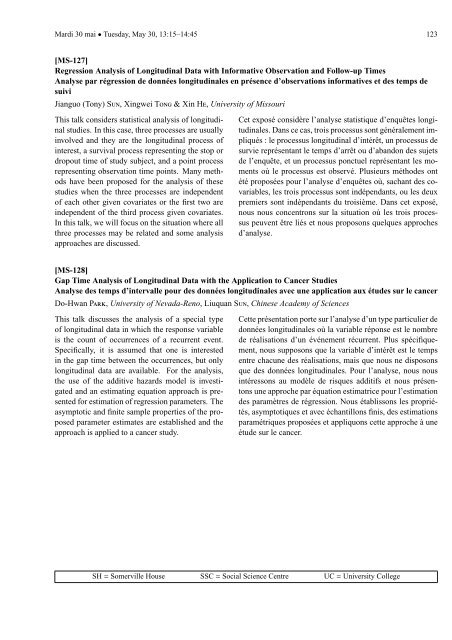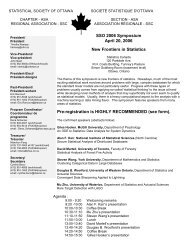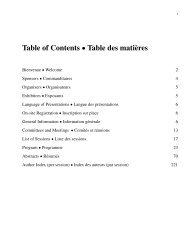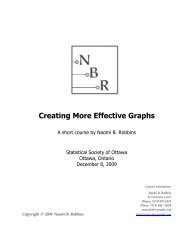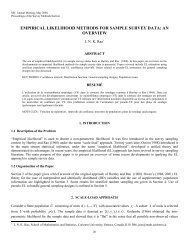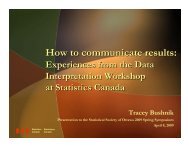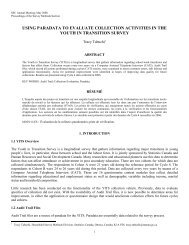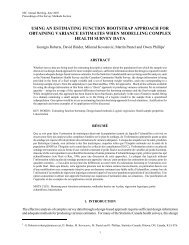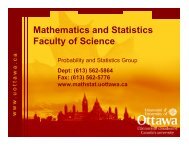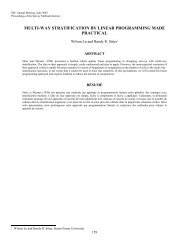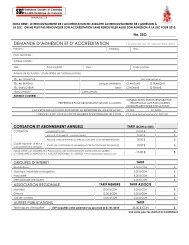Programme et résumés (pdf) - Société statistique du Canada
Programme et résumés (pdf) - Société statistique du Canada
Programme et résumés (pdf) - Société statistique du Canada
Create successful ePaper yourself
Turn your PDF publications into a flip-book with our unique Google optimized e-Paper software.
Mardi 30 mai • Tuesday, May 30, 13:15–14:45 123[MS-127]Regression Analysis of Longitudinal Data with Informative Observation and Follow-up TimesAnalyse par régression de données longitudinales en présence d’observations informatives <strong>et</strong> des temps desuiviJianguo (Tony) SUN, Xingwei TONG & Xin HE, University of MissouriC<strong>et</strong> exposé considère l’analyse <strong>statistique</strong> d’enquêtes longitudinales.Dans ce cas, trois processus sont généralement im-pliqués : le processus longitudinal d’intérêt, un processus desurvie représentant le temps d’arrêt ou d’abandon des suj<strong>et</strong>sde l’enquête, <strong>et</strong> un processus ponctuel représentant les mo-ments où le processus est observé. Plusieurs méthodes ontété proposées pour l’analyse d’enquêtes où, sachant des co-variables, les trois processus sont indépendants, ou les deuxpremiers sont indépendants <strong>du</strong> troisième. Dans c<strong>et</strong> exposé,nous nous concentrons sur la situation où les trois processuspeuvent être liés <strong>et</strong> nous proposons quelques approchesd’analyse.This talk considers statistical analysis of longitudinalstudies. In this case, three processes are usuallyinvolved and they are the longitudinal process ofinterest, a survival process representing the stop ordropout time of study subject, and a point processrepresenting observation time points. Many m<strong>et</strong>hodshave been proposed for the analysis of thesestudies when the three processes are independentof each other given covariates or the first two areindependent of the third process given covariates.In this talk, we will focus on the situation where allthree processes may be related and some analysisapproaches are discussed.[MS-128]Gap Time Analysis of Longitudinal Data with the Application to Cancer StudiesAnalyse des temps d’intervalle pour des données longitudinales avec une application aux études sur le cancerDo-Hwan PARK, University of Nevada-Reno, Liuquan SUN, Chinese Academy of SciencesThis talk discusses the analysis of a special typeof longitudinal data in which the response variableis the count of occurrences of a recurrent event.Specifically, it is assumed that one is interestedin the gap time b<strong>et</strong>ween the occurrences, but onlylongitudinal data are available. For the analysis,the use of the additive hazards model is investigatedand an estimating equation approach is presentedfor estimation of regression param<strong>et</strong>ers. Theasymptotic and finite sample properties of the proposedparam<strong>et</strong>er estimates are established and theapproach is applied to a cancer study.C<strong>et</strong>te présentation porte sur l’analyse d’un type particulier dedonnées longitudinales où la variable réponse est le nombrede réalisations d’un événement récurrent. Plus spécifiquement,nous supposons que la variable d’intérêt est le tempsentre chacune des réalisations, mais que nous ne disposonsque des données longitudinales. Pour l’analyse, nous nousintéressons au modèle de risques additifs <strong>et</strong> nous présen-tons une approche par équation estimatrice pour l’estimationdes paramètres de régression. Nous établissons les proprié-tés, asymptotiques <strong>et</strong> avec échantillons finis, des estimationsparamétriques proposées <strong>et</strong> appliquons c<strong>et</strong>te approche à uneétude sur le cancer.SH = Somerville House SSC = Social Science Centre UC = University College


